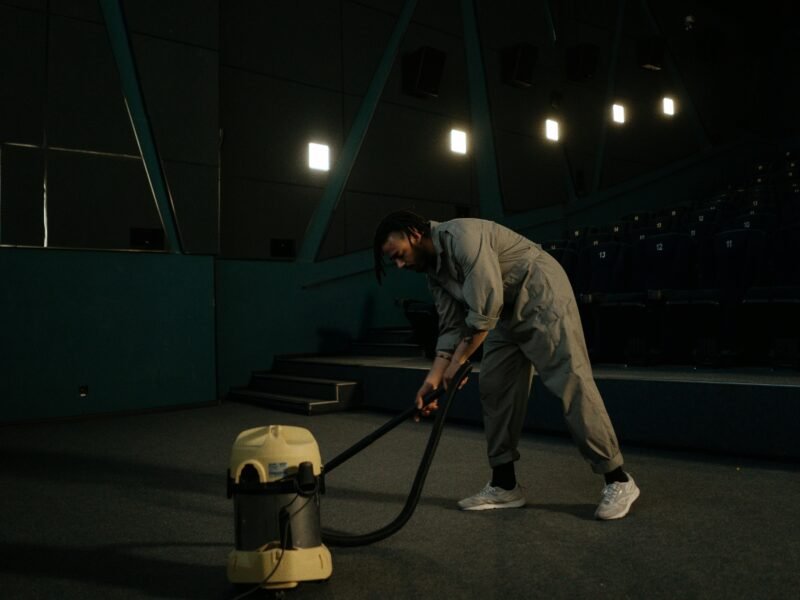Australia is one of the most attractive destinations for job seekers worldwide, with a growing demand for various industries, including janitorial and cleaning jobs.
These essential sectors offer various opportunities for both local and international workers, and for those looking to move to Australia, visa sponsorship options make the process much more accessible.
The Growing Demand for Janitorial and Cleaning Jobs in Australia
Australia’s robust economy and booming industries, including hospitality, healthcare, education, and construction, have driven an ongoing demand for janitorial and cleaning services. Cities like Sydney, Melbourne, Brisbane, and Perth are major hubs for commercial buildings, hotels, and public facilities that require regular cleaning and maintenance.
With an increasing population and expansion in urban areas, the demand for cleaning services has surged, leading to more job openings in the sector.
Janitorial and cleaning services encompass a variety of roles, including office cleaning, commercial cleaning, residential cleaning, industrial cleaning, and specialized cleaning (such as in hospitals or high-security environments). This growing demand has made janitorial and cleaning jobs a viable option for foreign workers seeking visa sponsorship to live and work in Australia.
Types of Janitorial and Cleaning Jobs in Australia
Janitorial and cleaning jobs in Australia come in many forms, catering to different industries and sectors. Here are some of the most common positions that offer visa sponsorship:
1. Office and Commercial Cleaning
Commercial cleaners maintain office spaces, ensuring that workplaces are hygienic and presentable. Duties include dusting, vacuuming, cleaning windows, and maintaining washrooms.
Office and commercial cleaners are typically employed by cleaning companies that serve corporate offices, government buildings, retail stores, and educational institutions.
Skills Required:
- Attention to detail
- Ability to work independently
- Experience in commercial cleaning is preferred
2. Residential Cleaning
Residential cleaners are employed to clean private homes, apartments, and condominiums. Their duties include vacuuming, dusting, washing dishes, cleaning bathrooms, and mopping floors. Residential cleaners often work with individual clients or through cleaning agencies.
Skills Required:
- Strong time management skills
- Friendly demeanor and good customer service
- Prior experience in residential cleaning is an advantage
3. Industrial Cleaning
Industrial cleaners work in factories, warehouses, and other industrial settings, where they are responsible for cleaning large, often hazardous, areas. These roles require handling heavy-duty cleaning equipment and may involve cleaning machinery or disposing of hazardous materials.
Skills Required:
- Ability to operate heavy machinery and cleaning equipment
- Knowledge of safety regulations in industrial environments
- Strong physical stamina
4. Hospital and Medical Facility Cleaning
Cleaning in hospitals and healthcare facilities requires attention to hygiene standards to prevent contamination and ensure patient safety. Hospital cleaners disinfect surfaces, clean medical equipment, and maintain sterile environments in operating rooms and patient rooms.
Skills Required:
- Knowledge of infection control procedures
- Attention to detail
- Ability to handle medical waste safely
5. Specialized Cleaning Services
Specialized cleaning jobs involve cleaning unique environments, such as high-rise buildings, public transport facilities, or airports. These jobs require specialized equipment, safety training, and sometimes working at heights or in confined spaces.
Skills Required:
- Expertise in using specialized equipment
- Ability to work at heights or in difficult conditions
- Safety and security awareness
Visa Sponsorship for Janitorial and Cleaning Jobs in Australia
For foreign workers looking to work in Australia in janitorial or cleaning roles, visa sponsorship can be a crucial pathway. Employers in Australia are increasingly seeking workers for these positions, particularly in regions facing labor shortages.
The Australian government has created visa programs to encourage skilled international workers to fill gaps in sectors such as cleaning and maintenance. There are several types of visas that employers can sponsor for international workers in the cleaning sector:
1. Temporary Skill Shortage (TSS) Visa (Subclass 482)
The TSS visa is a common option for workers in the janitorial and cleaning sectors. It allows skilled workers to stay in Australia for up to four years, depending on the occupation and employer. The visa is typically sponsored by an Australian employer who cannot find a local worker to fill the position.
Eligibility Requirements:
- The employer must nominate you for the position.
- You must meet health and character requirements.
- You should have at least two years of relevant work experience.
2. Skilled Independent Visa (Subclass 189)
The Subclass 189 visa is a permanent visa for skilled workers who are not sponsored by an employer or family member. This visa is points-based and requires applicants to meet the criteria in areas such as age, education, work experience, and English language proficiency.
Eligibility Requirements:
- You must be invited to apply based on your points score.
- Your occupation must be on the skilled occupation list.
3. Regional Sponsored Migration Scheme (RSMS) Visa (Subclass 187)
For janitorial and cleaning jobs in regional areas of Australia, the RSMS visa offers permanent residency to workers sponsored by an employer in a regional area. This visa is designed to encourage workers to live and work in less populated regions.
Eligibility Requirements:
- Sponsorship by an employer in a regional area.
- Relevant work experience and qualifications.
4. Working Holiday Visa (Subclass 417 and 462)
While not a permanent visa, the Working Holiday Visa allows individuals aged 18-30 (or 35 for some countries) to work and travel in Australia for up to two years. Many janitorial and cleaning workers use this visa to gain short-term employment opportunities.
Eligibility Requirements:
- Age restrictions (typically 18 to 30 years old).
- Valid passport from a participating country.
Salary Expectations
Salaries for janitorial and cleaning jobs in Australia vary depending on experience, location, and the type of cleaning services provided. On average, workers in this sector can expect the following salary ranges:
- General Cleaners: $45,000 to AUD 60,000 per year
- Industrial Cleaners: $50,000 to AUD 65,000 per year
- Specialized Cleaners (e.g., hospital or high-rise building cleaners): $55,000 to AUD 70,000 per year
- Cleaning Supervisors/Managers: $60,000 to AUD 80,000 per year
In addition to competitive wages, many employers offer benefits such as healthcare, paid leave, and opportunities for advancement into supervisory or managerial roles.
How to Secure a Janitorial and Cleaning Job in Australia with Visa Sponsorship
Securing a job in Australia’s janitorial and cleaning sector with visa sponsorship involves several key steps:
1. Research Job Opportunities: Many cleaning companies and recruitment agencies offer visa sponsorship. Use popular job search platforms like Seek, Indeed, and Australian Government job boards to find vacancies in the cleaning industry.
2. Prepare Your Resume: Highlight any relevant experience in janitorial and cleaning services, especially if you have worked in specialized settings such as hospitals or industrial environments.
3. Apply for Jobs with Visa Sponsorship: When applying for positions, be sure to look for employers offering visa sponsorship. Some job listings will specify whether visa sponsorship is available, while others may require you to reach out to the employer directly.
4. Meet Visa Requirements: Ensure that you meet the specific visa requirements for sponsorship, such as relevant work experience and English language proficiency.
5. Work with a Migration Agent: If you’re unsure about the visa process, consider working with a registered migration agent who can help guide you through the application process and ensure that you meet all requirements.
Conclusion
Janitorial and cleaning jobs in Australia offering visa sponsorship present an excellent opportunity for international workers looking to start a new life in one of the most beautiful and prosperous countries in the world. With competitive salaries, excellent job prospects, and various visa options, the cleaning industry in Australia offers both short-term and long-term career potential.
By researching the opportunities available, preparing your resume, and understanding the visa sponsorship process, you can take the first step toward securing a rewarding cleaning job in Australia. Whether you’re interested in residential, commercial, or specialized cleaning roles, Australia’s growing demand for cleaning services ensures there are plenty of opportunities waiting for you.






